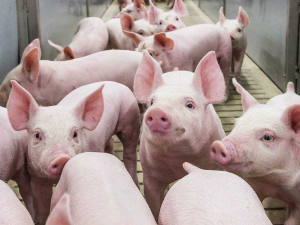Pork imports furore
Pork farmers says a significant influx of imported pork is causing them concern.
 US farmers say without government assistance, pigs may soon need to be culled on farms as there will be no room for them in pork plants.
US farmers say without government assistance, pigs may soon need to be culled on farms as there will be no room for them in pork plants.
US pig farmers could soon be culling on-site due to a COVID-19 induced backup at meatpacking plants.
According to a report by the Food & Environment Reporting Network (FERN), as many as 2 million pigs may be backed up on US farms due to slowed production and closures of meatpacking plants.
The statistics are based on claims from three US economists during a teleconference sponsored by the National Pork Board.
David Miller of Decision Innovation Solutions, associate professor Lee Schulz of Iowa State University, and associate professor Scott Brown of the University of Missouri all agreed during the teleconference last Thursday that a large number of pigs will be backed up.
Schulz says the backlog could exceed 2.2 million heads, whereas Miller estimated a backlog of 1.2 million and around 2.1 heads having disappeared since March 1, either due to direct sales, custom butchering, or euthanasia by farmers.
Brown says his estimates would be closer to Miller, who also claimed that pork prices in Autumn could be 20% to 25% lower than the year prior due to the potential backlog.
FERN says that USA pig farmers are using the numbers as evidence they need government further government support. Without such support, they say pigs may need to be culled on farms as there will be no room for them in pork plants.
The Real Estate Institute of New Zealand (REINZ) has released its latest rural property report, providing a detailed view of New Zealand’s rural real estate market for the 12 months ending December 2025.
Rural retailer Farmlands has released it's latest round of half-year results, labeling it as evidence that its five-year strategy is delivering on financial performance and better value for members.
OPINION: "We are back to where we were a year ago," according to a leading banking analyst in the UK, referring to US president Donald Trump's latest imposition of a global 10% tariff on all exports into the US.
DairyNZ says the Government’s proposed Resource Management Act reform needs further work to ensure it delivers on its intent.
Overseas Trade Minister Todd McClay says he's working constructively with the Labour Party in the hope they will endorse the free trade agreement (FTA) with India when the agreement comes before Parliament for ratification.
Donald Trump's latest tariff tantrum has again thrown the world of trade into a new round of turmoil and uncertainty, and NZ is caught up in it.

OPINION: A mate of yours truly reckons rural Manawatu families are the latest to suffer under what he calls the…
OPINION: If old Winston Peters thinks building trade relations with new nations, such as India, isn't a necessary investment in…